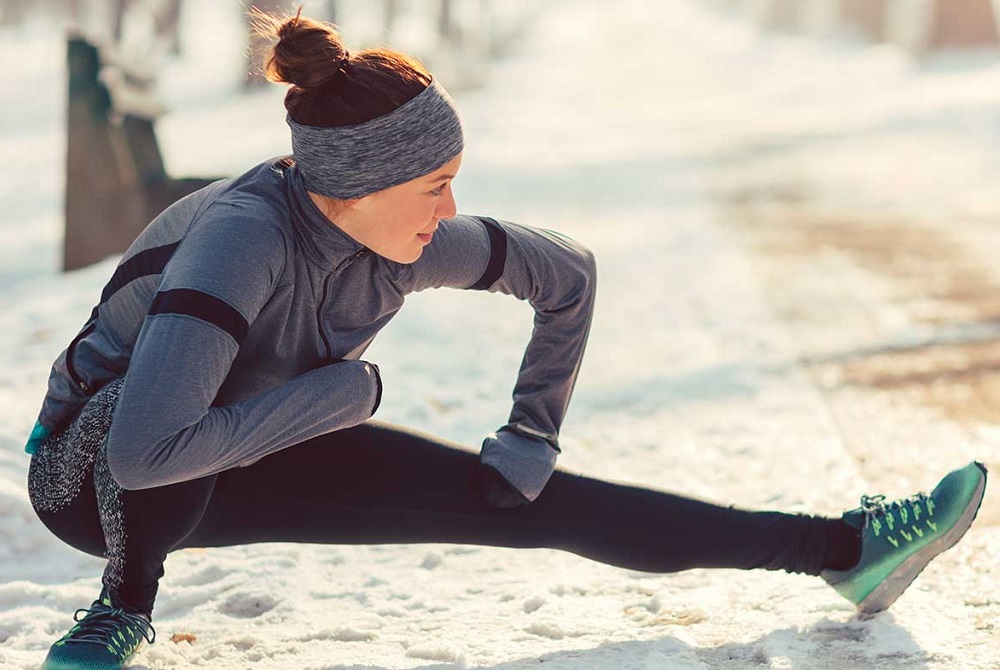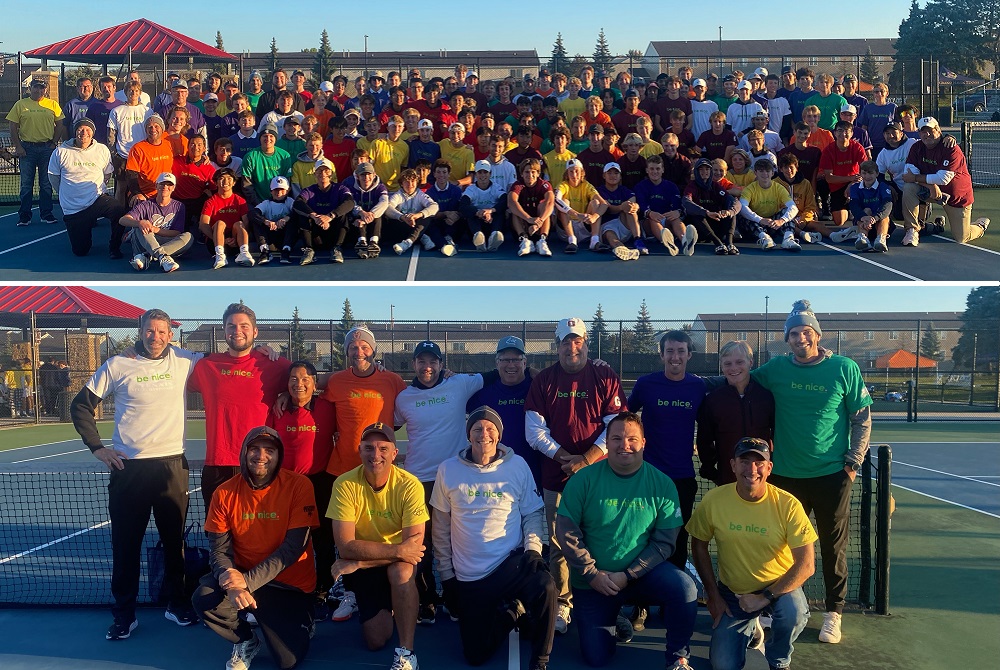
6 Tips for the Best Cold-Weather Workout
December 6, 2022
With temperatures getting colder, it may be tempting to get back to the gym.
 But it’s still possible to get your exercise outdoors if you prepare properly to counter the chillier conditions that accompany living in Michigan this time of year.
But it’s still possible to get your exercise outdoors if you prepare properly to counter the chillier conditions that accompany living in Michigan this time of year.
Winter Weather Workout Tips
While cold air can make it challenging to breathe, our bodies adjust to reduced temperatures over time. The key thing to watch for is hypothermia (dangerously low body heat).
"Viruses are more likely to attack our bodies if we're in a cold state," says Ramsey Shehab, M.D., a sports medicine specialist at Henry Ford Health. "If your internal body temperature drops significantly, it can suppress your immune system and make you more vulnerable to infection."
The good news: Adopting these six strategies can help ensure your outdoor workouts are safe and effective.
Check the forecast. Know what the outdoor weather is and plan accordingly. Pay attention to the temperature, wind and moisture level. If temps dip below zero, the wind chill is extreme, or it's raining or snowing, exercising outside can be risky.
Dress in layers. Dressing too warmly can increase your risk of overheating (even in frigid air). Instead, dress in layers so you can remove layers as you warm up. "The innermost layer should be made of moisture-wicking material," Dr. Shehab says. "The middle layer should have thermal protection like wool or fleece, and the outermost layer should be waterproof and breathable to protect you from wind, rain and sleet." If you get wet and moisture soaks through your clothing, you may not be able to keep your core body temperature up.
Pay attention to your hands, feet and head. When you're engaged in a heart-pumping workout, blood flows to your core, leaving your fingers, toes and head vulnerable to the cold. Wear a hat, gloves and warm socks. If it's especially chilly, consider wearing a scarf.
Take time to warm up (and cool down). Instead of leaving your cozy house and launching straight into a sprint, take time to warm up your major muscle groups. "Your joints may be stiffer when it's cold, so warming up and stretching out is especially important during the winter months," Dr. Shehab says.
Stay hydrated. People tend to think more about dehydration during the summer months, but you can get dehydrated in the winter, too. "Proper hydration before, during and after exercise is very important, not just to maintain health and well-being, but also to stave off infection," Dr. Shehab says.
Take a vitamin D supplement. Even though you're exercising outdoors, sunlight is in low supply in Michigan during the winter. To keep your immune system humming, consider taking a vitamin D supplement. "Making sure you have sufficient vitamin D can enhance your bone health, boost your immune system and keep your hormones in balance," Dr. Shehab says.
Get Savvy About Outdoor Workouts
Frigid temperatures can create obstacles for even the most enthusiastic exercisers. While it's tempting to table exercise until warmer weather returns, there are things you can do to make outdoor — and indoor — workouts more enjoyable.
You don't have to stick to the same routine of running, walking and circuit training. Take advantage of the winter chill to participate in activities like ice skating, sledding, hiking, skiing and cross-country skiing. You can even take interval workouts outdoors. Climb stairs, hike up hills or just play with a kettlebell in the snow.
"Exercise is medicine," Dr. Shehab says. "It can sometimes replace medication for people who have diabetes, hypertension and other chronic conditions. It's good for the mind and the body, and it can help stave off infections, including COVID-19."
The caveat: Working out, outdoors or indoors, is not recommended for people who are currently battling the coronavirus. Instead, it's important to preserve your energy. Once your symptoms begin to improve, you can gradually increase your exercise level.
To find a doctor or athletic trainer at Henry Ford, visit henryford.com or call 1-800-HENRYFORD (436-7936).
Dr. Ramsey Shehab is the deputy chief of Sports Medicine at Henry Ford Health. He sees patients at the Henry Ford Center for Athletic Medicine and Henry Ford Medical Center - Bloomfield Township.

O-K Red Tennis Rivals Team Up to Promote Mental Health Awareness
By
Jon Ross
MHSAA Director of Broadcast Properties
October 7, 2022
The Ottawa-Kent Conference Red boys tennis championship was decided Saturday, but all eight teams also teamed up for something bigger.
All participants from league members Caledonia, East Kentwood, Grand Haven, Grandville, Hudsonville, Jenison, Rockford, and Holland West Ottawa warmed up together, wearing special “be nice.” shirts in their respective school colors.
The Mental Health Foundation of West Michigan provides the be nice. program, with its mission to promote mental health awareness and prevent suicide through education with a four-step action plan (Notice, Invite, Challenge, Empower). Additionally, be nice. provides mental health awareness training to all head coaches of MHSAA-sponsored sport teams.
“Over the past four years, coaches have received mental health and suicide prevention education by learning the be nice. action plan through annual rules meetings. Now these coaches are bringing it to their athletes and parents,” said Christy Buck, executive director of the Mental Health Foundation of West Michigan. “To see these coaches recognize the importance of having mental health discussions on their teams with their athletes gives me the chills. For the entire O-K Red, 140 coaches and athletes, to then take it a step further and bring awareness to their community is incredible. The information people received that day, without a doubt, started important conversations that will be life-changing for someone who was struggling, and that's what we're trying to do. The be nice. team program is simple, accessible, and it's going to save lives."
Leading up to the competition, every team had access to a be nice. team training that taught them to recognize the signs and symptoms of a mental illness and how to take action when they notice these changes. This program is a simple and effective way to empower coaches and athletes with a game plan for mental health concerns. Parents and spectators also were briefed on the be nice. action plan before the tournament began.
“Tennis is competitive and intense in the Red, but for the players and coaches, we see tennis as an extension of something bigger. It's about life, friendships, camaraderie, learning how to deal with adversity, learning how to lose, learning how to win, coming together as a family and creating collective goals,” said Rockford varsity tennis coach Tom Huizing. “Every day we try to live the be nice. way. Not only within our teams or within our conference, but within our lives outside of tennis.
“We've had many be nice. matches within the O-K Red, but now we wanted to set the standard as a conference and let everyone know that we are in this life together. We will notice, invite, challenge, and empower. All of us, not just one player or one coach or one team. Every player, every coach, every team. We want to walk the walk, not just talk the talk. So that's what we're doing on the biggest stage for our tennis conference. We are coming together at the O-K Red Conference finals and we are making a pact as an entire conference to be nice.”
Hudsonville and West Ottawa ended the season as co-champions of the O-K Red.
PHOTO The O-K Red brought together 140 athletes and coaches for its boys tennis championship tournament and also in an effort to bring awareness through the be nice. program. The entire group is pictured above, and the coaches below. (Photo courtesy of be nice.)

